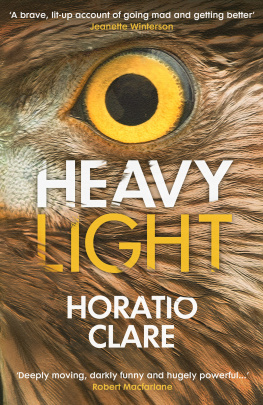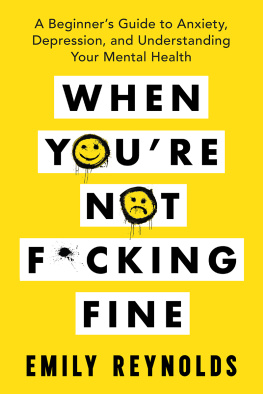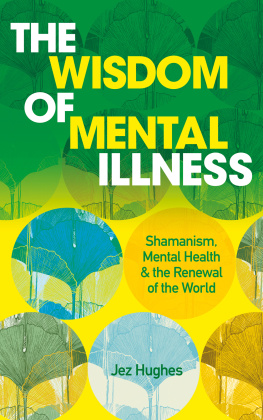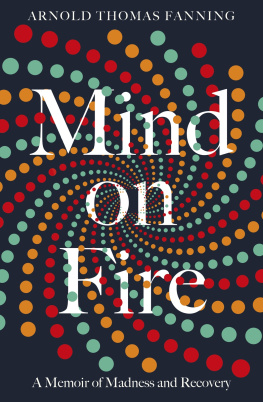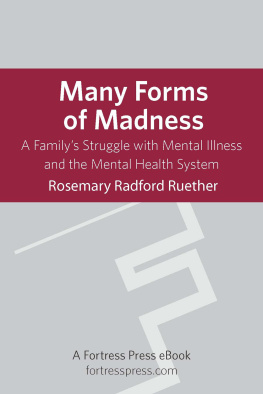

Horatio Clare
HEAVY LIGHT
A Journey Through Madness, Mania and Healing

Contents
About the Author
Horatio Clare is the bestselling author of numerous books including the memoirs Running for the Hills and Truant and the travel books A Single Swallow, Down to the Sea in Ships, Orison for a Curlew, Icebreaker and The Light in the Dark. His books for children include Aubrey and the Terrible Yoot and Aubrey and the Terrible Ladybirds. Horatios essays and reviews appear on BBC radio and in the Financial Times, the Observer and the Spectator, among other publications. He lives with his family in West Yorkshire.
BY THE SAME AUTHOR
Non-fiction
Running for the Hills
Truant: Notes from the Slippery Slope
Sicily: Through Writers Eyes
A Single Swallow
Down to the Sea in Ships
Orison for a Curlew
Myths and Legends of the Brecon Beacons
Icebreaker
The Light in the Dark: A Winter Journal
Something of his Art: Walking to Lbeck with J. S. Bach
Fiction
The Princes Pen
For Children
Aubrey and the Terrible Yoot
Aubrey and the Terrible Ladybirds
For Rebecca because there are no words.
If I should fall from grace with God
Where no doctor can relieve me
Shane MacGowan
Authors note
Sometimes my memory flashes up a scene, an exchange, something I said or did, and I flinch in horror and shame.
But how on earth could you possibly have believed any of it? I think. Yet it was not a question of belief. It was what was. The whole thing was as real as a full stop on a page.
This is the story of how I went mad, how I was treated, how I got better and of what I know, now, about how we deal with madness and breakdown. A personal journey through society, psychiatry and psychotherapy, this book seeks understanding of a widespread crisis, which shame and fear have tended to conceal.
There are different terms for what I experienced. The plainest is madness, which descends through Old English from the Latin, mutare, to change, and the proto-Germanic gamaidaz, changed for the worse.
As we shall see, the diagnosis, treatment and monetisation of all the different forms of changed for the worse that we now experience has made the language of these conditions slippery and treacherous.
According to a model which treats madness as you would a disease, we begin the story in mania and travel through psychosis to recovery (there is no cure). Another perspective has it that this is a story of extreme distress which moves through crisis into healing (there is no end).
They agree on psychosis a technical term in the disease model for a state involving hallucinations and delusions. Another way of understanding psychosis is to take its Greek meaning, sick of soul, literally. I would ask my reader to hold both these perspectives in mind as you witness behaviour which might otherwise seem inexplicable, or all too explicable.
This aims to be a straightforward story. I hope it might offer some help, hope and insight to those who suffer breakdowns and to those who love and care for them.
Part I
CHAPTER 1
Signs and wonders
Manchester airport in December, rain spittles the early-morning dark. In Terminal 3 lines of families with baggage trolleys queue up in matched sets. I skim around check-in fetching coffee for my partner, croissants and fruit for the boys. I smoke outside, feeling like a pirate impostor in what looks to me like a bourgeois festival of skiing, of happy families and decorum. With clumsy sleight of hand I conceal a knuckle of hash in my hold bag.
My partner, Rebecca, and her elder son, Robin, seventeen, are wary of me. They look suspicious and irritated. I am ebullient. I dismiss the worry and reproof in their faces. I am on holiday at last. Arent we all on holiday? Havent I earned a bit of folly? Over the last months I have published and publicised two new books, started a new job and crossed and recrossed the country speaking in bookshops and festivals.
Steadily, as autumn turned to winter, I have risen through feelings of optimism and energy into hypomania. Hypomania describes an excited state of elevated mood. It is characterised by flights of ideas, surges of vitality, sleeplessness and irritability. In this state it feels natural to spend incautiously, to begin new relationships and make exciting plans. Mildly alarming to friends and family, hypomania brings with it dash, wit and charisma. People can be drawn to its light and glamour. I had taught well, putting immense effort and belief into my students. At my book events I had evangelised for an understanding of cyclothymia (a mild form of bipolar, from which I suffer) and seasonal affective disorder; I felt charged with a significant mission, even as my condition intensified. The light by which I felt surrounded, the light I threw and reflected, became an alarming glare.
Hay, Cambridge, Manchester, Chester, Halifax, Cardiff, London, Felixstowe, Bath, London again and back and forth to Hebden and Manchester I have done longer tours, but this was a yo-yo of constant journeys out and back. I split the soles of my feet until they bled, lost my voice and contributed to many magazines, newspapers and radio programmes while clinging to a resolution to make it home to Yorkshire at the end of each night.
My diary from this period is an eloquent record of a crazed attempt to be everywhere at once. Not recorded there are my internal staccatos perfectionism, ambition, inadequacy, guilt or my secret strategy. I was using cannabis as a stimulant and, with drink, a tranquilliser.
I know cannabis has a history of making me manic but I have been happy to pay that price in return for the energy hypomania grants. I will stay on top of it all, of course. I am done, now, finished with this huge effort of work. I can lay off and relax. Everything will be fine. This holiday is Rebeccas idea. She has arranged and paid for it.
She knows how hard I have been working. She has watched me becoming hypomanic since November, seen my optimism, my energy and my sleeplessness accumulating. She is thinking that if she can just get us all to the mountains we will be able to relax. She is hoping that being outside in the snow and air, away from work and pressure, will help me to calm down.
In the queues I horse around with our son, five, who is also excited. He gauges the tension between Daddy and Mummy. They argue sometimes but they love each other, he knows, and everyone loves him. He is especially happy because his brother, whom he worships, is with us. At security Rebecca and the children go through while my backpack is turned aside for searching. I wait in the security zone, perching up on the repacking table, surveying the queues, the cameras, the searchers, the scanners, the conveyors, the trays and the passengers, and I begin to play the game. I know it
Next page
